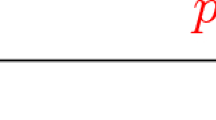Abstract
In this paper, I propose that one can have reason to choose a few tickets in a very large lottery and arbitrarily believe of them that they will lose. Such a view fits nicely within portions of Lehrer’s theory of rational acceptance. Nonetheless, the reasonability of believing a lottery ticket will lose should not be taken to constitute the kind of justification required in an analysis of knowledge. Moreover, one should not accept what one takes to have a low chance of being true. Accordingly, one should take care not to believe of too many tickets that they are to lose. Finally, while arbitrariness is no absolute barrier to epistemic reasonability, one may not be able to believe that one’s lottery ticket will lose if one cannot regard oneself as knowing it will lose.
Similar content being viewed by others
Notes
Interestingly, Lehrer (1983) considers the possibility of reasonable arbitrariness in a novel interpretation of Wilfrid Sellars’s empirical acceptance rules. While not endorsing a rejection of a symmetry principle, Lehrer finds that such a position is “justified by systematic epistemic objectives and is in no way ad hoc (…)” (Lehrer 1983, p. 469).
In (Ross 2003), I responded to Lehrer’s earlier argument (of the first edition of Theory of knowledge), framed in the language of beating a competing claim proposed by a skeptic. Essentially the same argument is reformulated in (2000), and thus I update the argument to use his later theory here.
Hawthorne and Lasonen-Arnio (2009) have to complicate Low Chance considerably in order to accommodate the possibility of knowing contingent a priori truths having a low objective chance of being true. These details need not concern us here.
References
Alston, W. (1985). Concepts of epistemic justification. The Monist, 62, 57–89.
David, M. (2001). Truth as the epistemic goal. In M. Steup (Ed.), Knowledge, truth, and duty: essays on epistemic justification, responsibility, and virtue (pp. 151–169). Oxford: Oxford University Press.
Douven, I. (2008). The lottery paradox and our epistemic goal. Pacific Philosophical Quarterly, 89, 204–225.
Foley, R. (1993). Working without a net. New York: Oxford University Press.
Harman, G. (1986). Change in view: principles of reasoning. Cambridge, MA: MIT Press.
Hawthorne, J., & Lasonen-Aarnio, M. (2009). Knowledge and objective chance. In P. Greenough & D. Pritchard (Eds.), Williamson on knowledge (pp. 92–108). Oxford: Oxford University Press.
Klein, P. (1985). The virtues of inconsistency. Monist, 68, 105–135.
Kvanvig, J. (2009). Assertion, knowledge and lotteries. In P. Greenough & D. Pritchard (Eds.), Williamson on knowledge (pp. 140–160). Oxford: Oxford University Press.
Lehrer, K. (1974). Knowledge. Oxford: Clarendon Press.
Lehrer, K. (1983). Sellars on induction reconsidered. Noûs, 17(3), 469–473.
Lehrer, K. (2000). Theory of knowledge (2nd ed.). Boulder, CO: Westview Press.
Lehrer, K. (2003). Reply to Ross. In E. J. Olsson (Ed.), The epistemology of Keith Lehrer (pp. 326–329). Dordrecht: Kluwer.
Ross, G. (2003). Reasonable acceptance and the lottery paradox: the case for a more credulous consistency. In E. J. Olsson (Ed.), The epistemology of Keith Lehrer (pp. 91–107). Dordrecht: Kluwer.
Vogel, J. (1990). Are there counterexamples to the closure principle? In M. D. Roth & G. Ross (Eds.), Doubting: contemporary perspectives on skepticism (pp. 13–27). Dordrecht: Kluwer.
Author information
Authors and Affiliations
Corresponding author
Rights and permissions
About this article
Cite this article
Ross, G. Reconsidering the lessons of the lottery for knowledge and belief. Philos Stud 161, 37–46 (2012). https://doi.org/10.1007/s11098-012-9939-y
Published:
Issue Date:
DOI: https://doi.org/10.1007/s11098-012-9939-y




